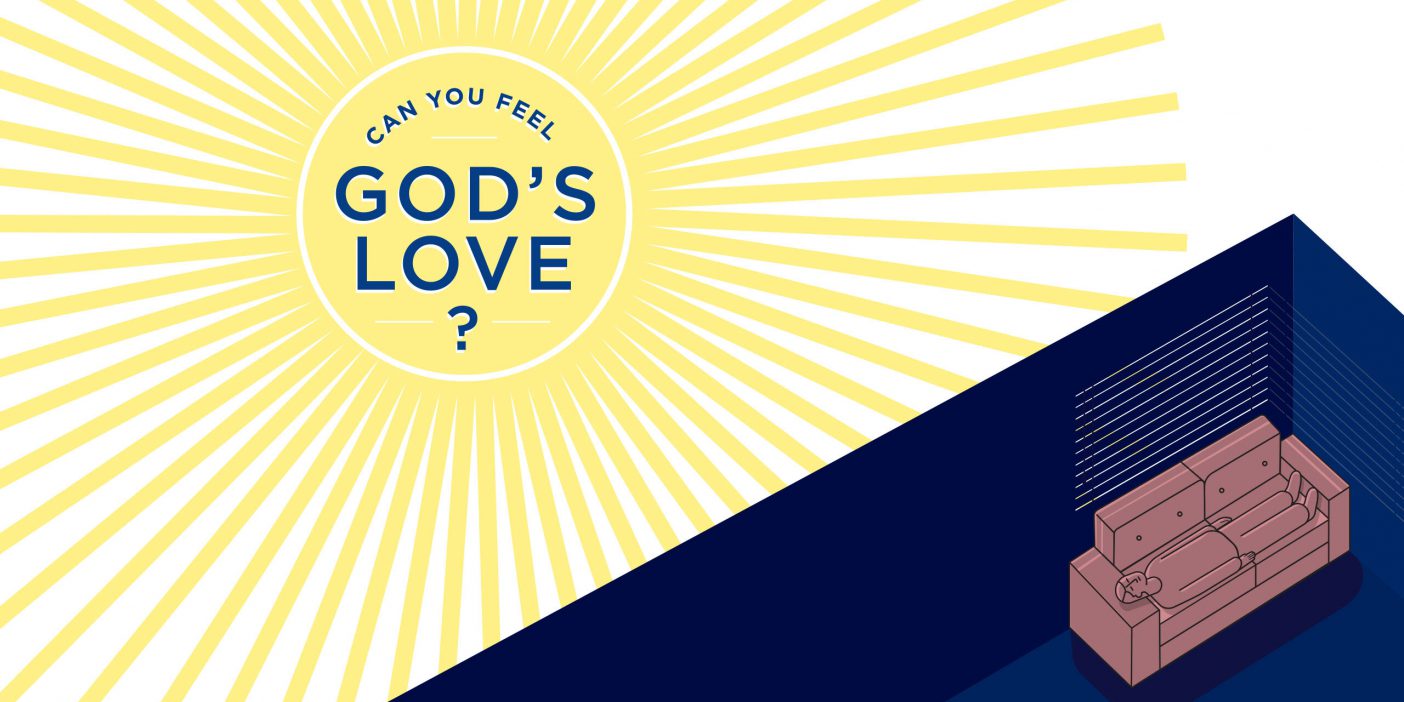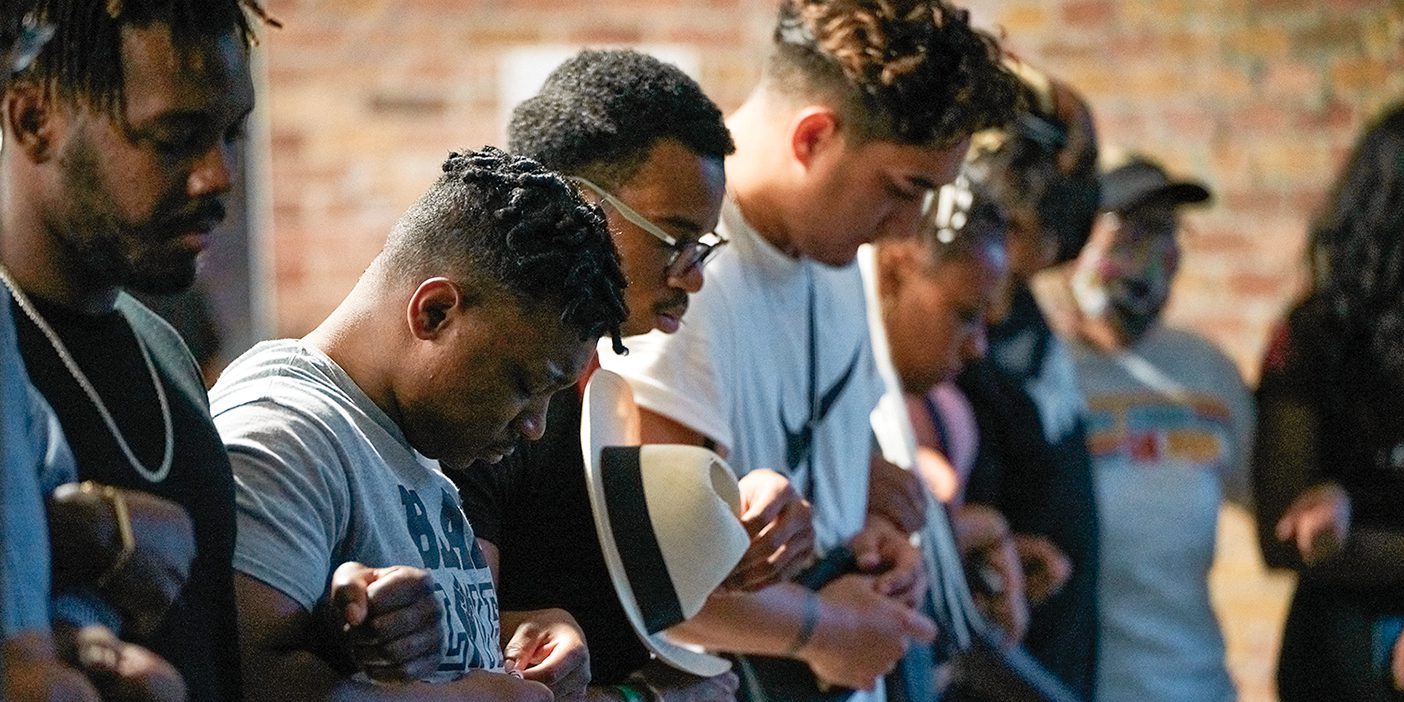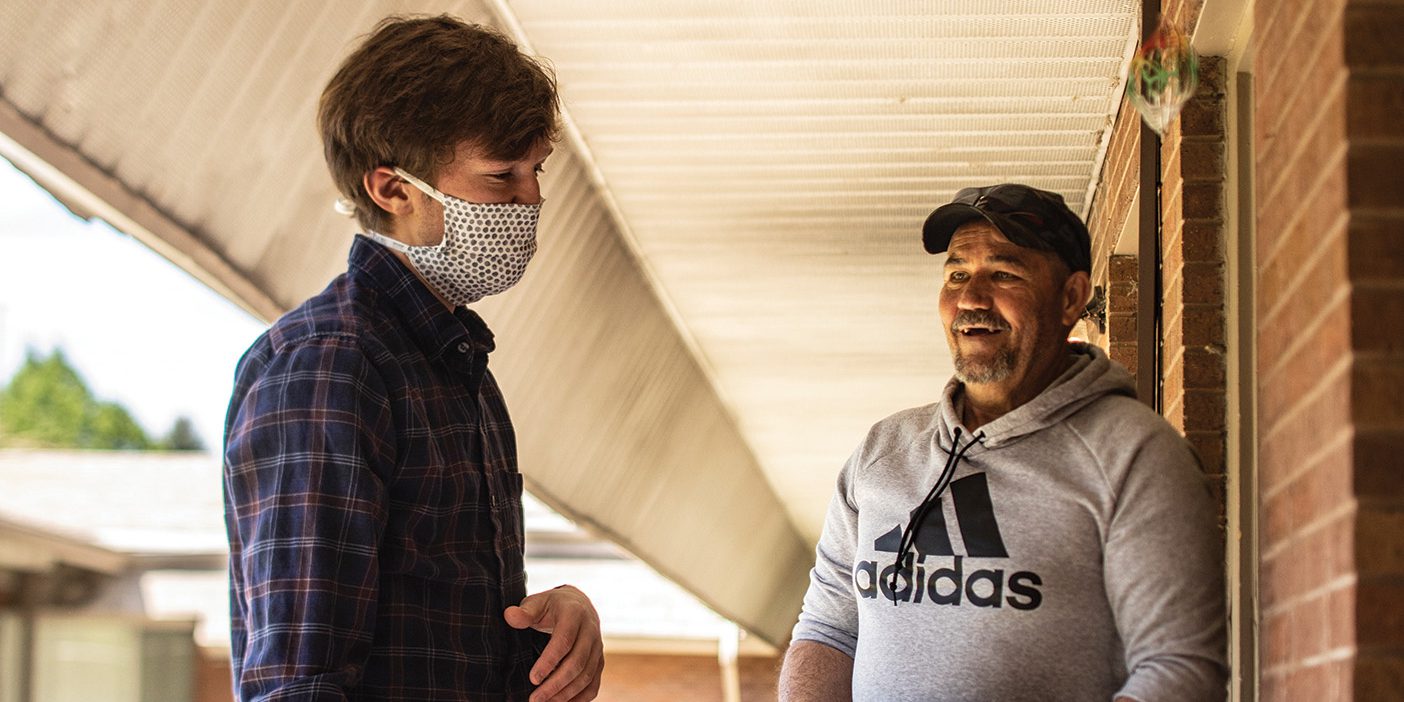Loneliness: The Shadow Pandemic
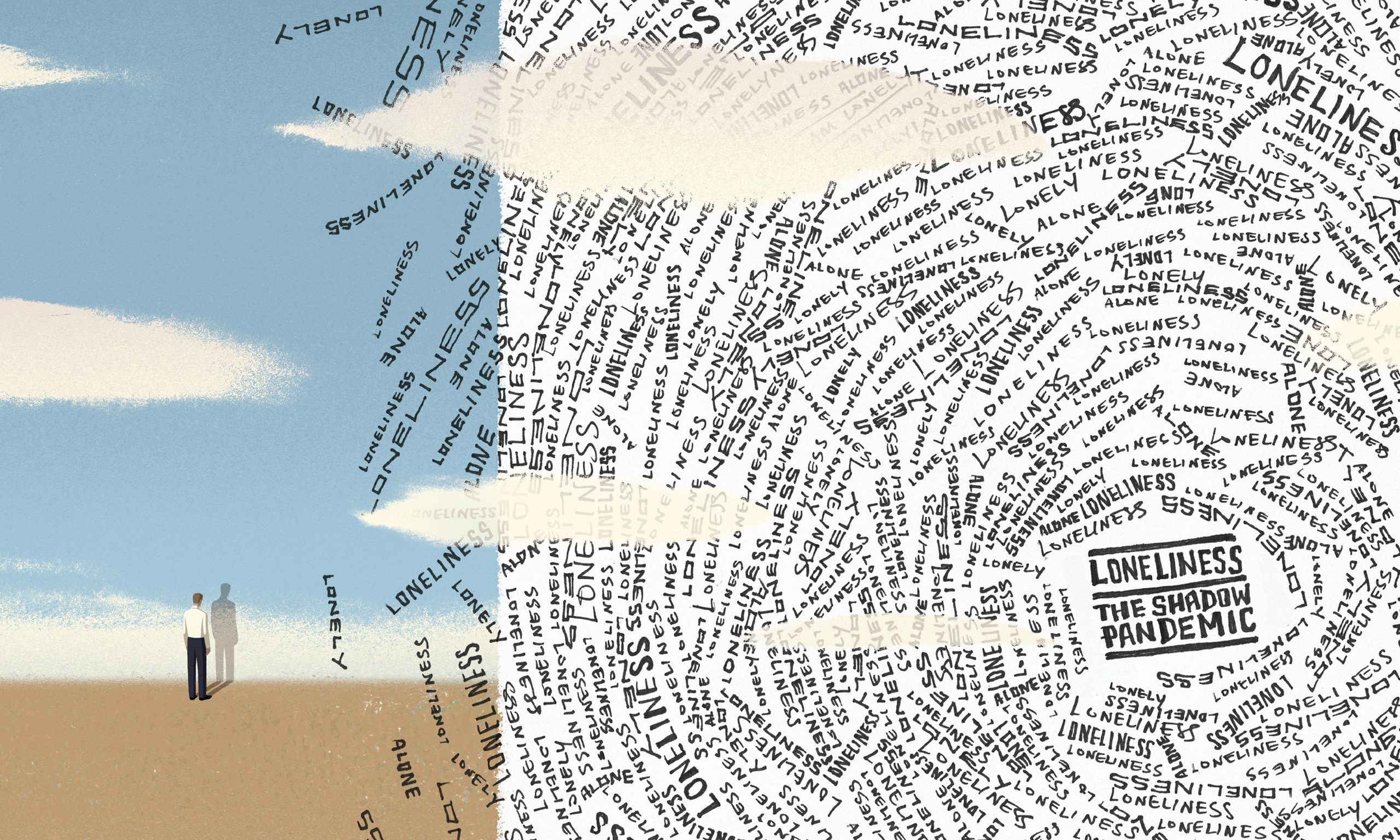
Behind the headlines of COVID-19 is another far-reaching health crisis.
By Melody McGrath Warnick (BA ’99) in the Summer 2020 Issue
Illustrations by Jon Krause
Six months ago, before the coronavirus outbreak roiled the world, we used to have lunch dates with friends. We hosted board-game nights. We went to book club. Back in the days before social distancing was a key part of anyone’s lexicon, we chatted our way through church potlucks and neighborhood barbecues. We visited Grandma. Then in spring 2020, as governments advised self-isolation and announced stay-at-home orders to stop the spread of COVID-19, millions of us lost a million little social outlets.
Temporarily sacrificing our socializing to slow a worldwide pandemic is a trade most of us were happy to make. And yet BYU research has shown that the loss of so many social ties can create its own set of devastating health consequences. In two studies, psychology professors Julianne Holt-Lunstad (BS ’94, MS ’98) and Timothy B. Smith (BS ’91) have found that our relationships impact our physical health so profoundly that chronic loneliness and isolation can be as dangerous as a pack-a-day smoking habit. Loneliness can shorten your life span by about five years.
Coronavirus may have given us all a taste of what it’s like to be cut off from loved ones—and made us swear never to bail on plans with friends again. But loneliness and social isolation were proliferating well before social distancing and sheltering in place aggravated the problem. According to a 2020 survey by insurance provider Cigna, 61 percent of American adults say they always or sometimes feel lonely. Even after COVID-19 is controlled, loneliness will be the shadow pandemic that remains.
Worse than Smoking, Obesity, and Pollution
“I don’t know if there’s anyone who has never felt lonely,” says Holt-Lunstad. She remembers struggling with loneliness in 2001, right after she arrived at Brigham Young University as a newly hired professor. Instead of socializing together, her colleagues would finish work and head home to be with their families. “As a new faculty member, I remember feeling really isolated. That was a really hard transition.” Eventually, Holt-Lunstad found her place in the social network of her department, but it took time.
She later partnered with Smith on a project to analyze 148 studies of the relationship between social and physical health. The big reveal, published in 2010: social disconnection turned out to be worse for health than big-name problems like obesity, alcoholism, and pollution. “The medical community had never considered that social factors could be even more important than biological factors like high blood pressure, obesity, or high cholesterol levels,” says Smith. “Our findings showed that it had more of an impact.”
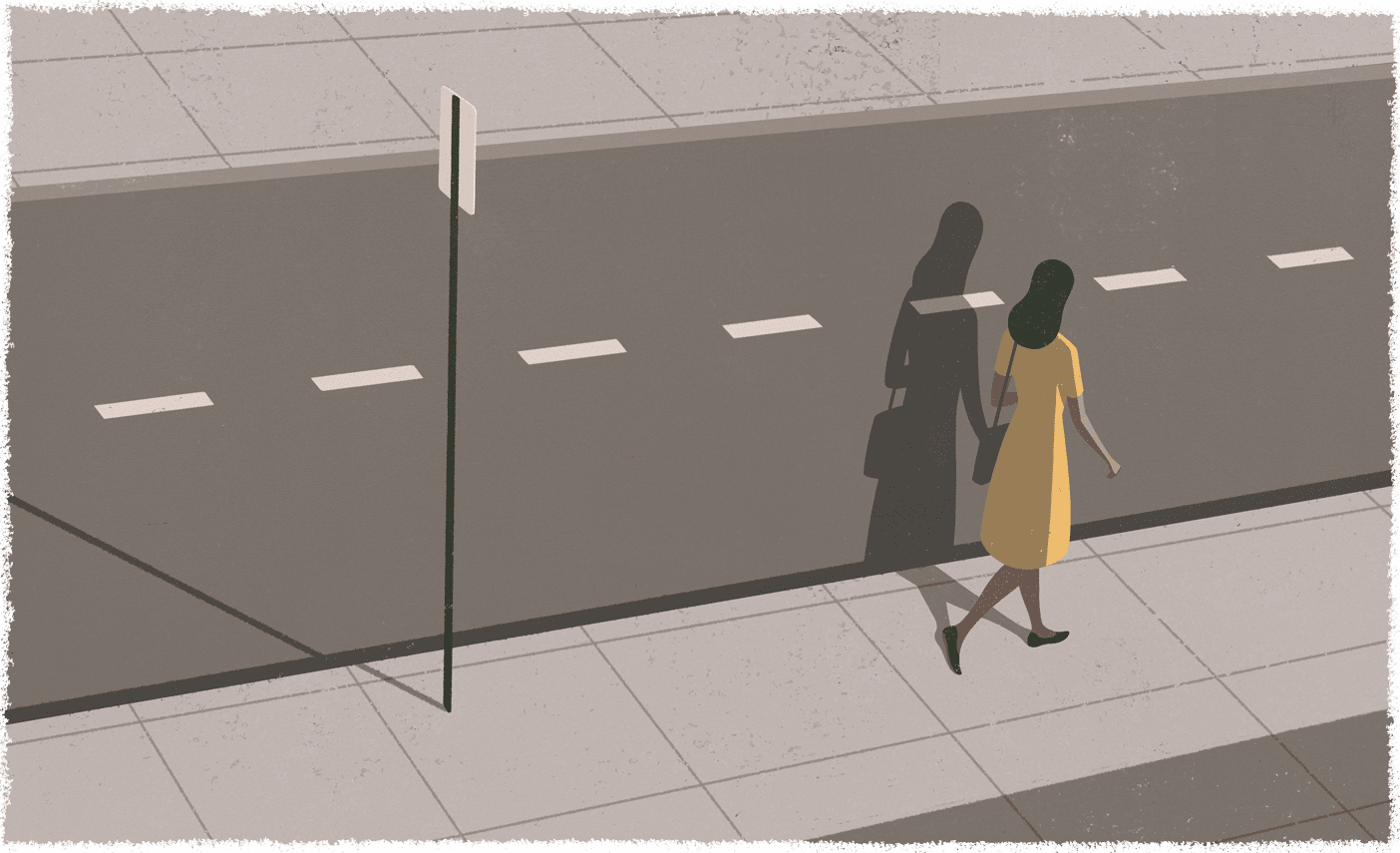
In other words, people who don’t have strong social support mechanisms—think trusted friends and family members—persistently experience poorer outcomes, including inflammation, cognitive decline, depression, reduced immune function, and earlier death. Epidemiological proof of the innate value of human relationships felt, to Smith, heaven sent. “It was like a law to the universe was partially revealed—that [relationships] are not just good for us spiritually or emotionally; they’re good for us physically,” says Smith. “That’s remarkable.”
In a second study, in 2015, the pair looked specifically at how feeling lonely, being socially isolated, or living alone affects one’s mortality. Again, the findings were startling. People who live alone, they found, have a 32 percent increased likelihood of death—a dramatic discovery considering that 35.7 million Americans are in single-person households. And those who reported being lonely or socially isolated also had a much higher risk of dying.
That’s scary because loneliness—that peculiar longing-tinged sadness—is a nearly universal experience that crosses borders and cultures and can affect us as easily when we’re in a crowd as when we’re alone. Nor is it a curse reserved for the elderly. The loneliest Americans are, in fact, the youngest. A whopping 79 percent of Gen Zers and 71 percent of millennials report feeling lonely, compared to only half of baby boomers. Even college students on a crowded campus can struggle with it. “I don’t think BYU is immune to this at all,” says Holt-Lunstad.
Loneliness may be hitting young people harder because they’re particularly susceptible to some of its root causes. For instance, studies have shown that 73 percent of heavy social-media users feel lonely. As an emotion, loneliness grows in the gap between the social life you want and the social life you actually have. Social media seeds an awareness of exactly how many people are hanging out without you. Plus, it creates the sensation that you’re with friends without providing any of the benefits of real-life contact. (According to a University of Pennsylvania study, limiting social media use to 30 minutes per day can help.)
Other reasons why, young or old, we may feel lonely:
Life Transitions
Loneliness is more common after a major life change, like divorce, moving, having a baby, retiring, or starting college, because such changes pull us out of our typical social circles. Take brand-new BYU freshmen, for instance. “They miss their friends, they miss their parents, they miss their foundational tribe, so to speak,” says Holt-Lunstad. “So they’re on unsure social ground in their new setting.” That’s a recipe for loneliness.
Mental-Health Concerns.
Those who grapple with depression and anxiety are at significantly greater risk for experiencing loneliness. In turn, loneliness and isolation can exacerbate existing mental-health challenges, forming a vicious cycle.
Modern Life
Demanding jobs, long commutes, and geographic mobility have made us more isolated by leaving us without the time or emotional bandwidth to nurture relationships.
Uncertainty
Loneliness is a perception, and not everyone who is isolated or lives alone feels lonely. But in times of uncertainty (hello, coronavirus), we’re more likely to crave the reassurance of connection. When we can’t find someone close to offer support, loneliness enters.
Reframing Loneliness
Candice Clark Stevens (BA ’92, MA ’98) knows something about loneliness. The BYU grad’s marriage came undone after 27 years. Four of her five children have reached adulthood and no longer live with her. After years as an at-home parent, she found herself coming home from her job as an accountant in Iowa City, Iowa, to rattle around in an empty house. “Loneliness,” she says, “is pretty keen in my life right now.”
Although she is hardly alone in feeling lonely, Stevens finds it uncomfortable to discuss her loneliness. She doesn’t want to become an object of pity.
That response wasn’t surprising to Holt-Lunstad. “There’s a lot of stigma and shame around loneliness,” she points out. “A lot of people don’t want to admit it.”
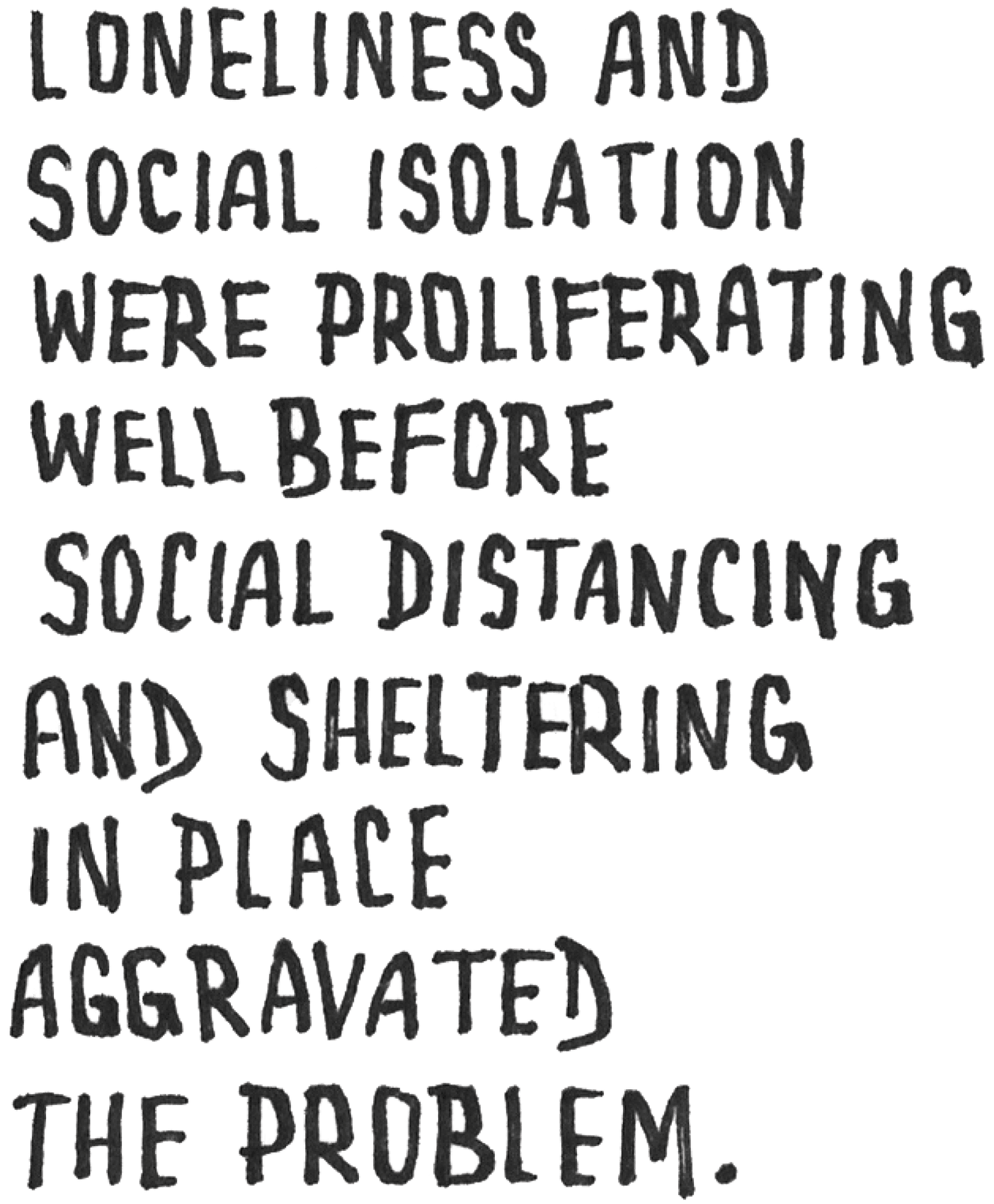
The stigma is unfortunate, the BYU researchers say, because loneliness is a simple biological imperative, like hunger. When you feel hungry, it’s your body’s way of telling you, “Hey, time to eat.” There’s little emotional baggage to unpack. You just recognize it as an internal reminder to meet a physical need—and you eat. Simple as that.
Similarly, loneliness is your body and mind’s way of saying, “Hey, you need to be around people.” It’s not a comment on your likeability or popularity. “It’s this distressing, uncomfortable feeling that’s meant to motivate you to reconnect,” Holt-Lunstad says. “Even someone who has tons of access to food can find themselves feeling hungry.”
In this time of coronavirus, many people are feeling a hunger for social connection that all the phone calls and Zoom trivia nights in the world can’t seem to satisfy. But if there’s one silver lining, it’s that the COVID-19 crisis has highlighted how devastating social isolation really is—and heightened public interest in it. Recently, Smith and Holt-Lunstad’s research has been featured in the New York Times, the New Yorker, the Atlantic, and Science.
Even before the coronavirus pandemic, Holt-Lunstad had become a de facto spokesperson for the issue, testifying about loneliness before the U.S. Senate, consulting at 10 Downing Street, and coauthoring a February 2020 National Academy of Sciences report about addressing loneliness in health care. But maybe the coronavirus will be what finally makes it clear that such a complex, large-scale problem deserves a large-scale response.
Strengthening Your Bonds
Meanwhile, is it possible for you to reduce your loneliness load right now? That’s the goal for Candice Stevens, who takes a multipronged approach to battle her own isolation. For instance, she engages in deep discussions with the women in the monthly book group she cofounded. (Motto: “You are not required to like the book.”) She chats with her teenage ministering brother at church. For a while she shared with a friend a Google Drive folder that they call their Curiosity Club, where they both would periodically jot down funny or pleasant observations, upload interesting articles, or otherwise share insights.
Loneliness hit her particularly hard after she started working from home during COVID-19. “Not having church services has also been noticeable,” she says. But she adds, “I had a FaceTime Come, Follow Me discussion with my sister this past Sunday. That was nice.”
On hard days she flips through her mental contacts list and asks herself, “Who would it be helpful for me to talk to right now?” and, “Who might be available?” An old BYU roommate? A sibling? Tapping into her long-nurtured network of friends and relatives, even for just a few minutes, eases her isolation. “These are the people who make me feel loved,” Stevens says. According to the BYU research, they may, in fact, be saving her life.
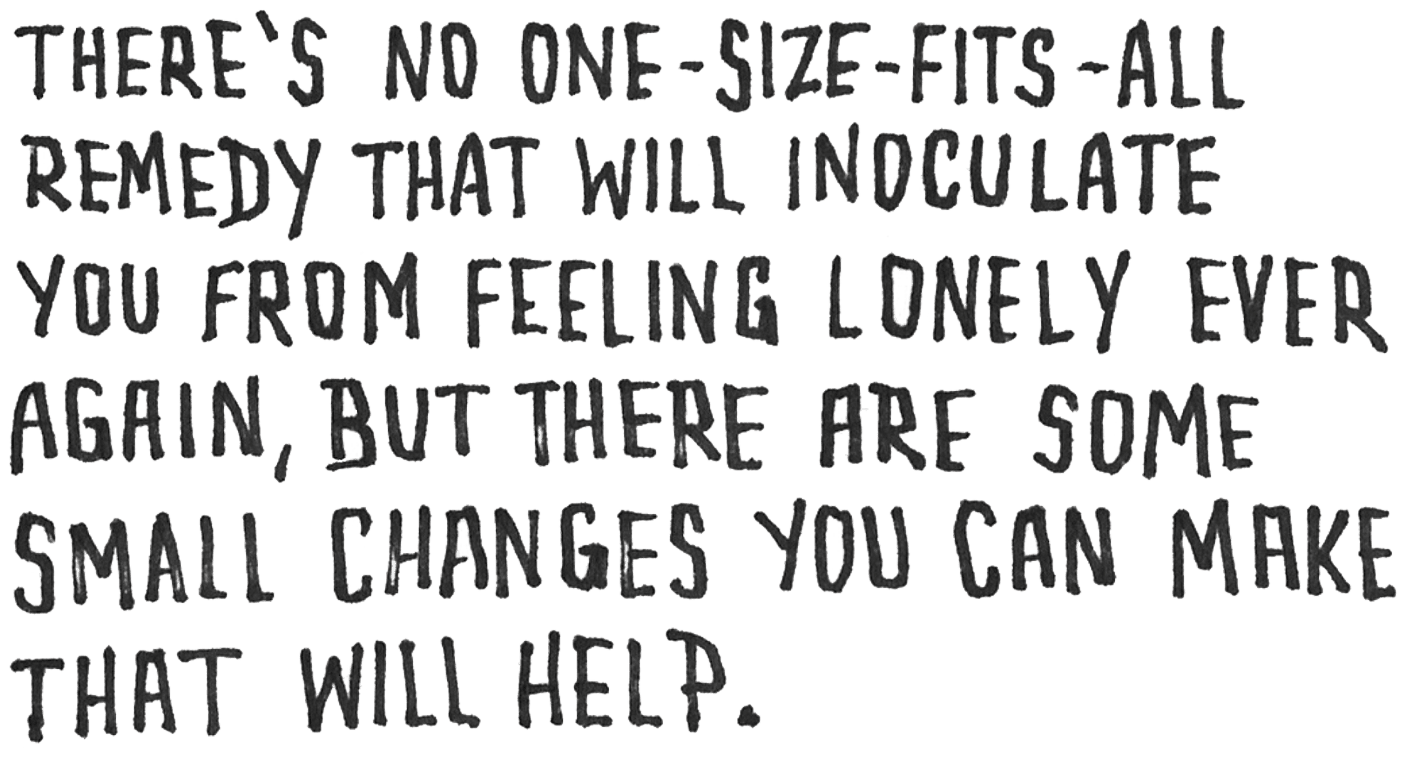
There’s no one-size-fits-all remedy, no party you can throw that will inoculate you from feeling lonely ever again. But there are some small behavioral changes you can make that will help you cope with the loneliness you feel, reduce your social isolation, and craft more meaningful relationships in a world that—pandemic or not—has become more socially distant. The advice that Holt-Lunstad, Smith, and BYU alumni mental-health experts share here can protect your health for years to come:
Conduct a Self-Assessment
Ask yourself: “Do I feel lonely? What am I doing to foster new relationships? To nurture existing ones?” As life changes (yes, even apart from the coronavirus), what met your social needs five years ago may not work for you anymore. Consider how you’re really doing and what you might need to change.
“Acknowledge that loneliness is a very normal human emotion that we will all experience on and off in life,” says Stacy J. Roberts (BS ’03), a Salt Lake City–based therapist and clinical social worker. “It doesn’t mean anything is wrong with you. Sometimes we just need to notice and feel the feelings without judgment.”
Use Technology for Good
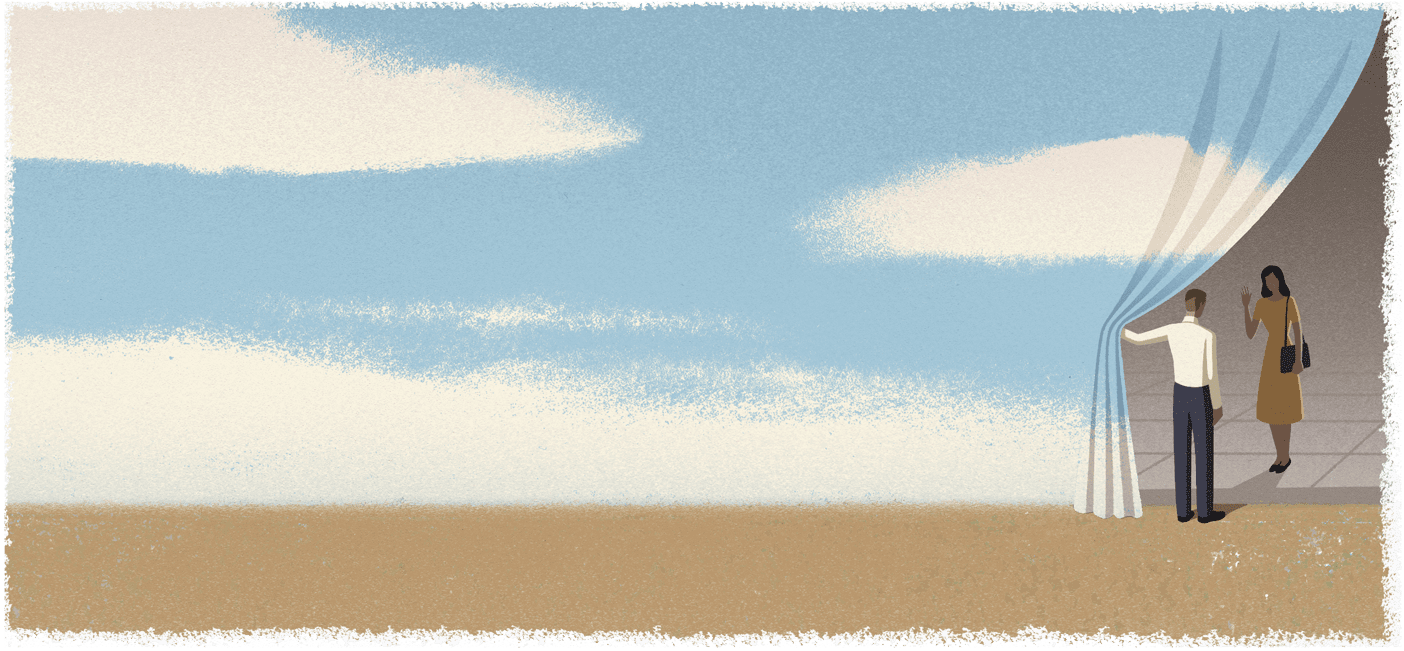
Technology gets a bad rap for exacerbating loneliness, but when you can’t see loved ones in person (like during a pandemic), FaceTime hellos and Zoom game nights can save your sanity. Use the Marco Polo app to send short video messages to friends around the country or the Bumble app to find a local match for an in-person friend date. Or give the Provo-based ZooWho app a try. Founded by the father of a BYU student, it gives you space to jot down info you want to remember about friends (“She’s training for a 5K”), reminds you about important dates, and tracks how often you call.
Look Beyond Your Spouse
For most members of The Church of Jesus Christ of Latter-day Saints, “family relationships are the most intimate, enduring, impactful, and consequential relationships that we have,” says Smith. “So it makes sense to emphasize those relationships most of all.” Even when your spouse is your best friend, however, research shows that a strong support network of his/hers/ours friends can make your marriage happier.
Be Intentional
After college—the only period of your life when all your besties live within 100 feet—making friends requires focused effort. Jessica A. Berrio (BS ’99), a clinical social worker and therapist in American Fork, Utah, signed up for a moms group after she realized the isolation of new motherhood was making her depressed. Now as a single parent, joining groups is her social-health go-to. “I need that connection,” Berrio says. “It might take five different groups or programs to allow me to feel like I’m not alone.” For others, the solution might be working a room at a networking event, volunteering, ministering, getting to know neighbors, or gathering for dinner with a small group of close friends.
Curb Your Negative Bias
A friend doesn’t sit by you at church. Is that because he doesn’t really like you? Lonely people tend to interpret ambiguous social signals negatively. To combat that, offer emotional support rather than fret that it wasn’t provided. “If you’re at a party, look for someone who’s alone and go talk to that person,” says Holt-Lunstad. “It makes it easier because you’re focused on the other person, but helping that other person is probably the best way to help yourself.”
Express Love
Set a goal to every day tell someone in your life that you care about them, whether that’s your spouse, a friend, a child, a coworker, a mentor, or a church leader. Letting people know that you value their role in your life promotes connection. Bonus point for introverts: texts do the trick. “I’m completely an introvert, and people respond well to positive messages online,” says Smith. “I like to tell people things like, ‘Way to go!’ ‘I was thinking of you the other day,’ or, ‘You really made a difference to me.’”
Just Do Something
“Depression lies,” says Colette Dalton (BS ’10, MSW ’12), a clinical social worker and manager of counseling at Ensign College, in Salt Lake City. “I think a lot of mental illnesses are that way. Your brain is telling you, ‘No one wants you around, no one likes you.’ So it becomes even easier to isolate when actually what you need most is connection.” One therapeutic approach she recommends is called “behavioral activation,” which boils down to forcing yourself to do something—like calling a friend instead of bingeing Netflix by yourself.
Open Up
“I think about how many people I see from the Latter-day Saint community in my office and how many of them come in and tell me how alone they feel at church,” says Michelle S. Lee (BS ’02), a licensed psychotherapist based in Palo Alto, California. “Some of these people are in the same ward and have no idea that many other people are feeling that way!” she says. If you’re willing to open up about your experience, “you’d be amazed at how many people would resonate with that.”
Rely on the Lord
As a miserably lonely freshman, Rachel Wagers Baumann (BA ’09), of Houston, Texas, prayed, “Heavenly Father, can you please just help me meet one friend?” A few minutes later, on her way to a movie for class, she felt prompted to leave through a different door in her dorm—and ran into a neighbor. “Hey, are you going to the movie?” the neighbor said. “Do you want to go together?” They became fast friends, changing Baumann’s school experience forever. As Smith points out, because of God, “literally we are never alone.”
Small Things
Even as firm believers in the health benefits of social connections, the BYU researchers are like everyone else, prone to get busy with work and let relationships atrophy over time. “Our research is a constant reminder to be more social,” says Smith, whose brother regularly quotes the study findings to nudge him to make friends despite being naturally introverted. As a result, Smith joined a group that hikes together each week and he regularly works in the temple—a surprisingly social experience.
Meanwhile, Holt-Lunstad recently took a weekend girls’ trip to Moab, Utah. “I had a gazillion things to do, and it would have been really easy to say, ‘There’s no way I can,’ but I had to block that out and make time. The work is never going to be done. I can’t wait till all of the things on my to-do list are completed or I’ll never spend time with anyone.”

Developing and maintaining relationships is, in fact, work. But it’s joyful too. And as the research reveals, its protective health benefits are worth the effort.
Before the pandemic Candice Stevens sat down one morning across the aisle from the driver on the Iowa City bus that would take her to work. “Good morning!” she said. “My name is Candice. You’ve been driving me to work for three months now. May I know your name?”
The driver’s name was Sarena. Now every time Stevens gets on the bus, she sits behind Sarena and chats with her till the next stop. It’s only a minute or two of casual interaction, but it’s added another name to her emotional contacts list.
Melody Warnick is a freelance journalist who lives in Blacksburg, Virginia.
Feedback: Send comments on this article to magazine@byu.edu.


